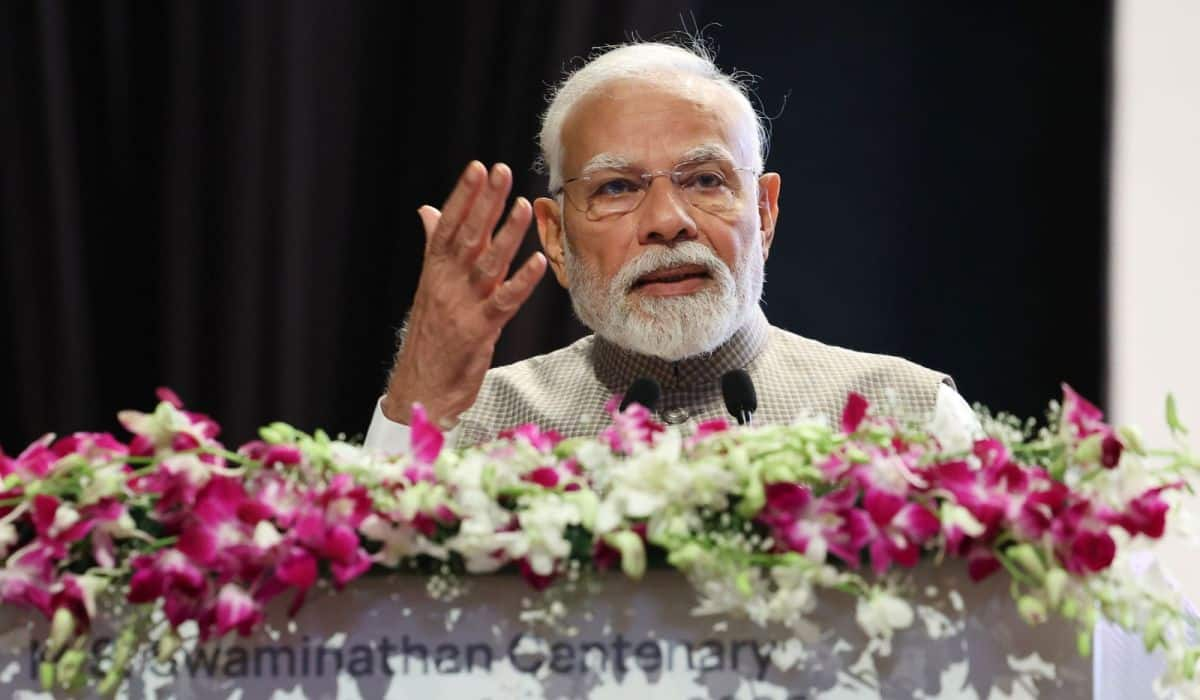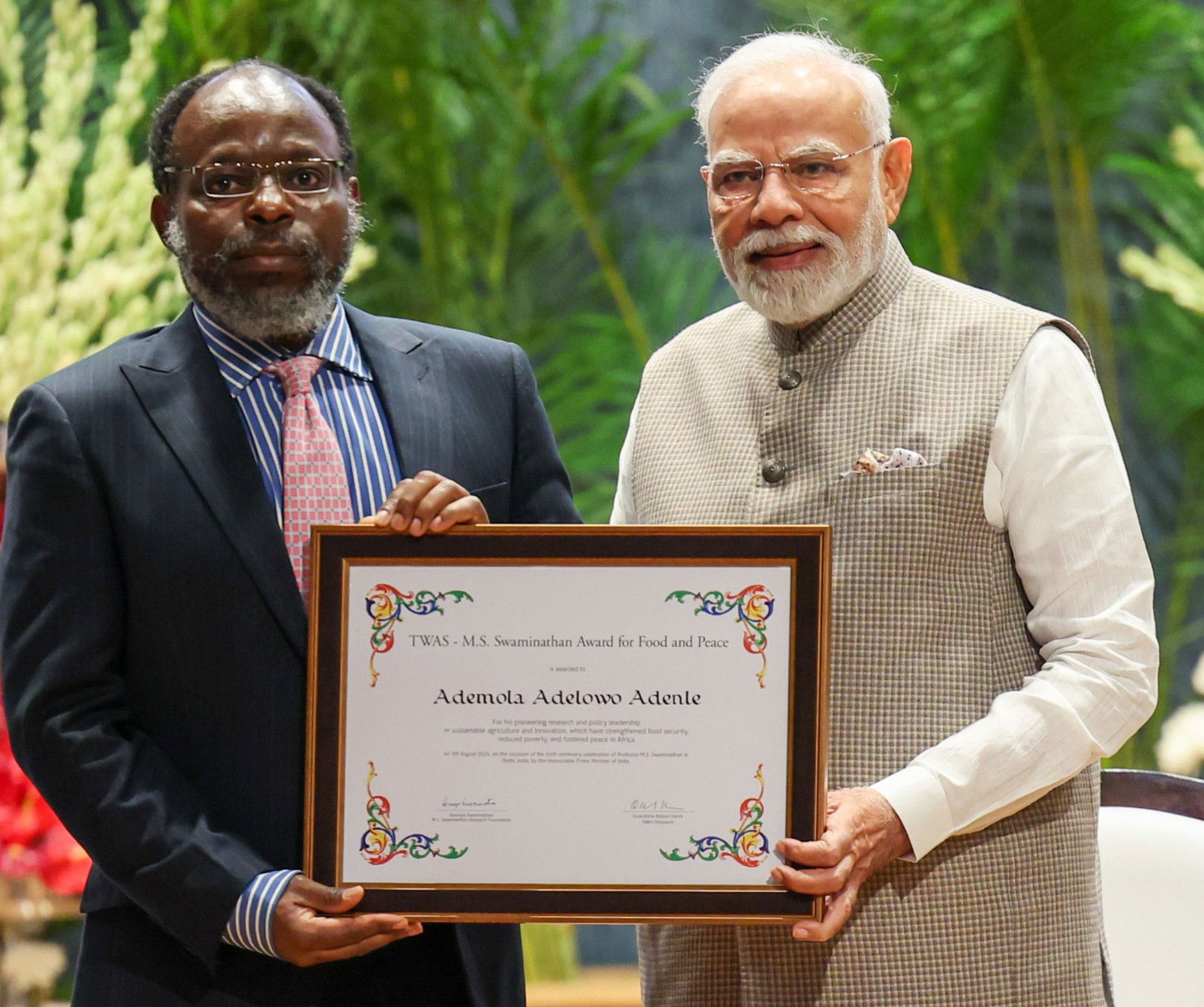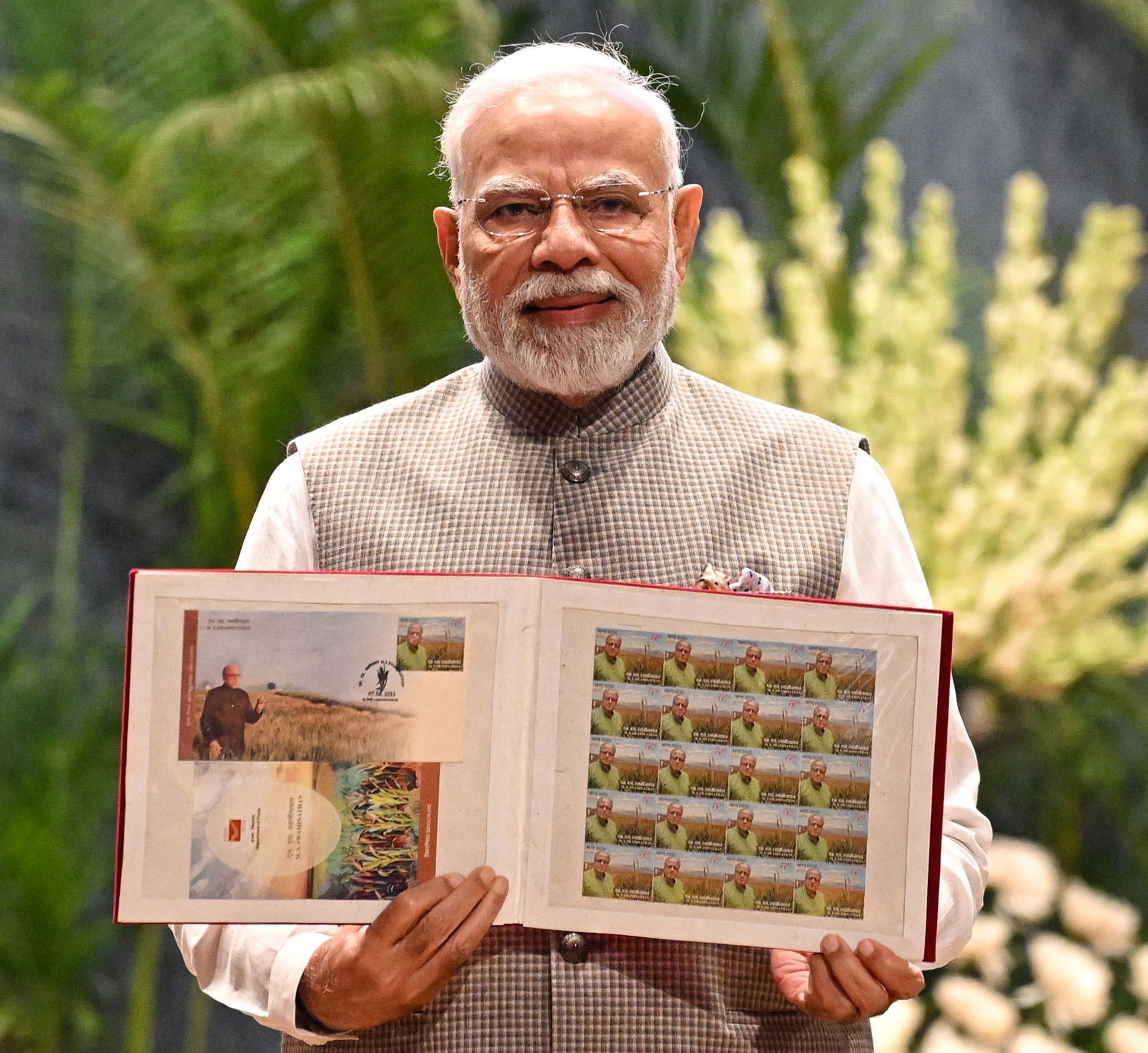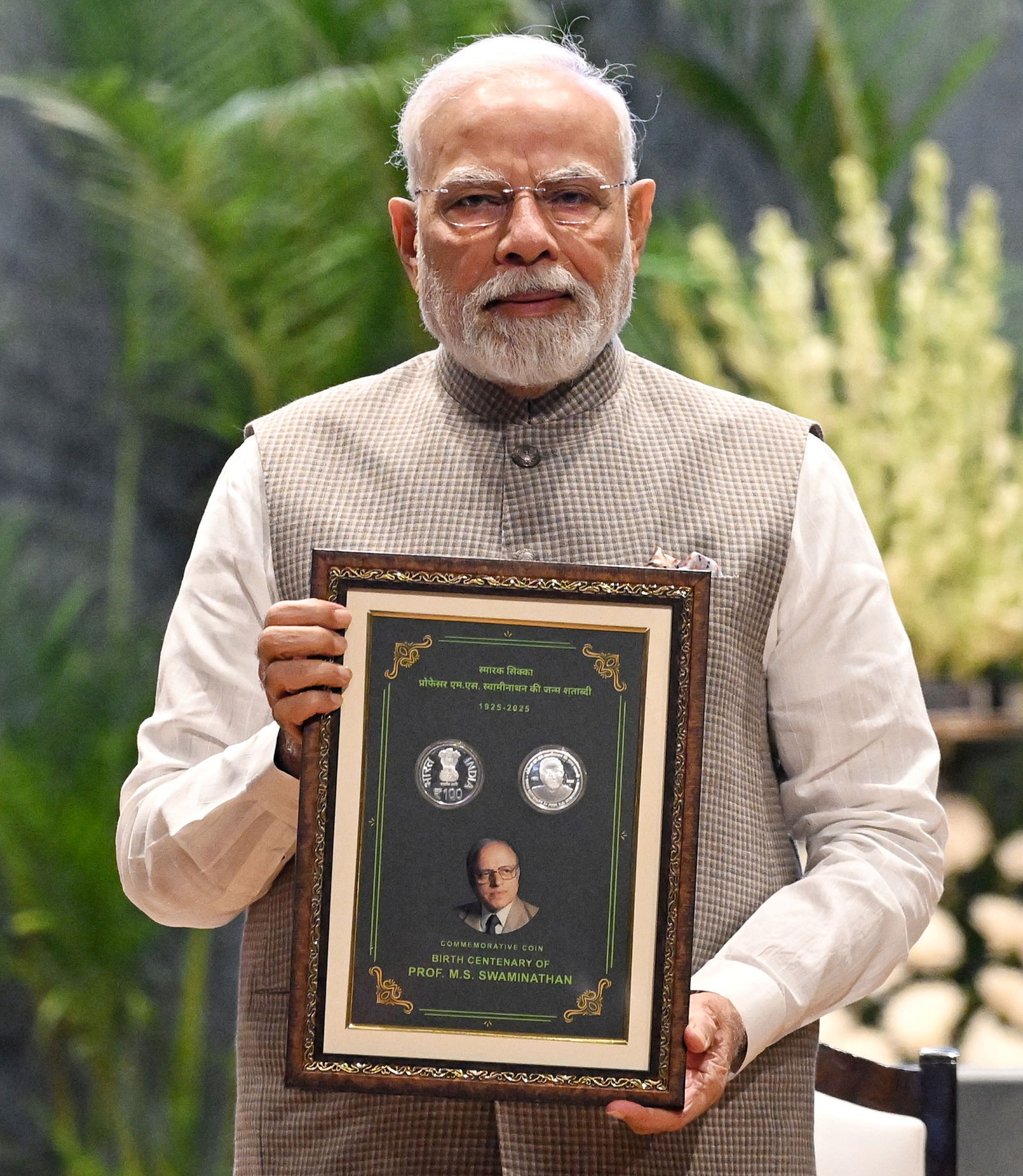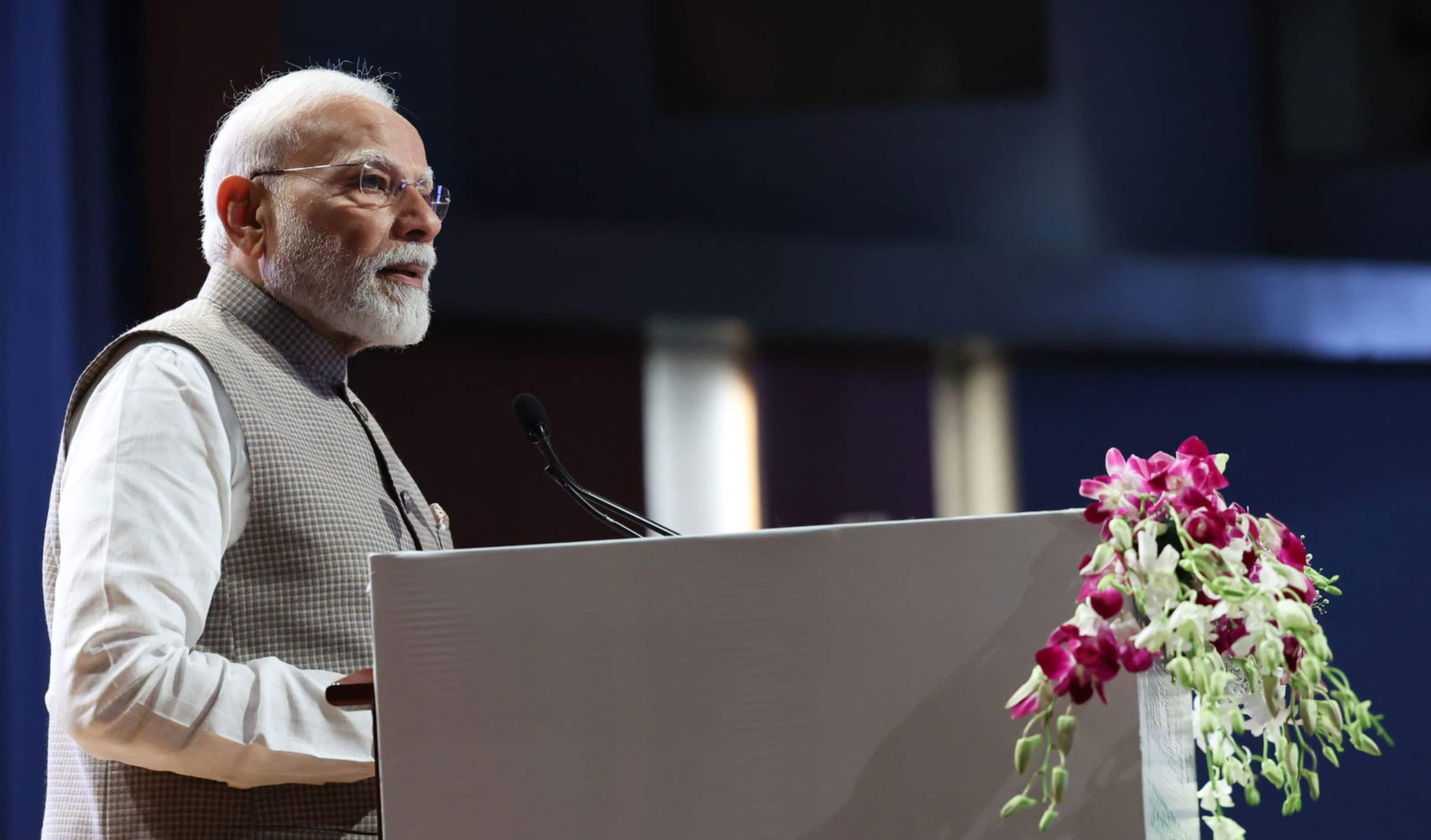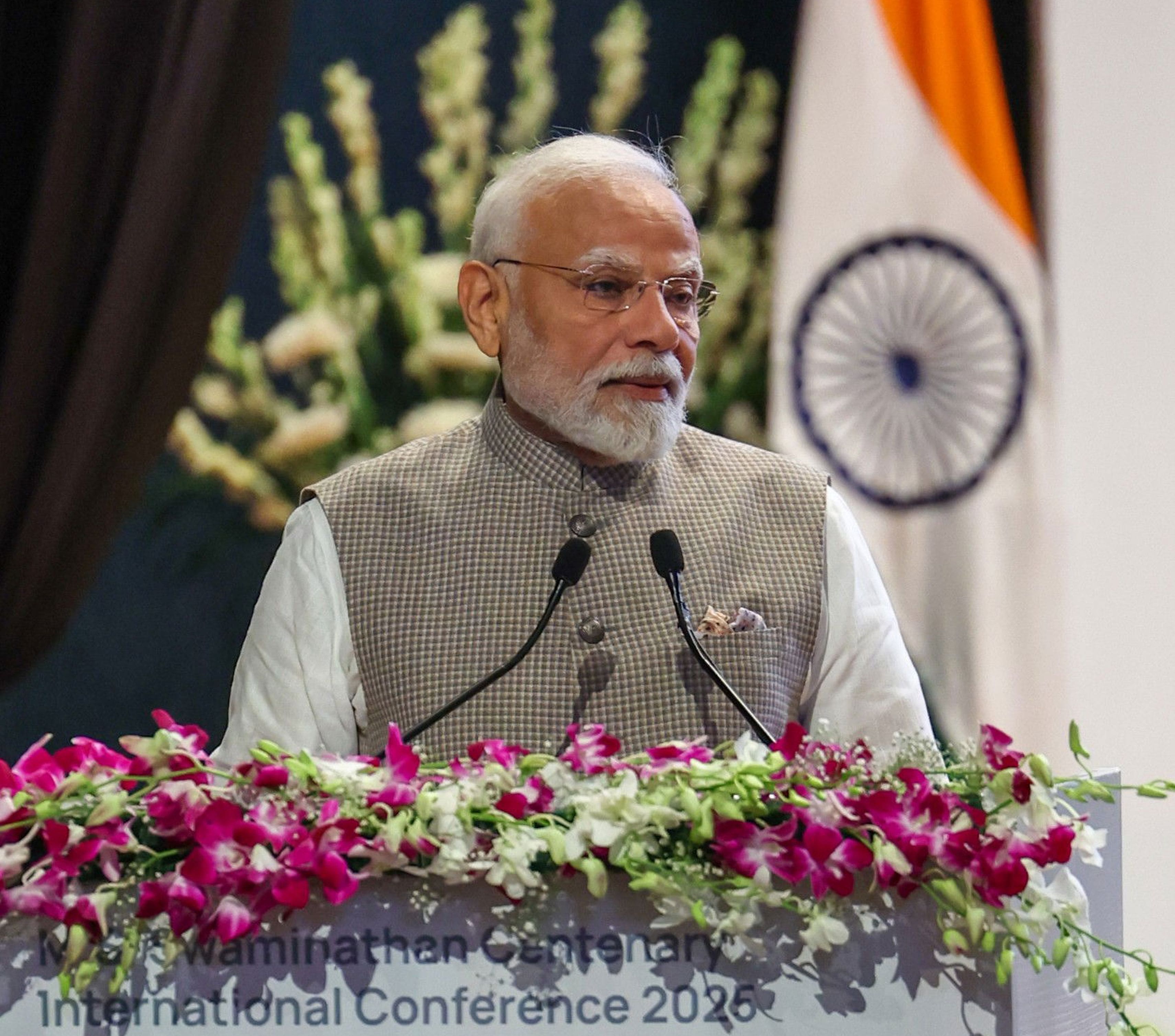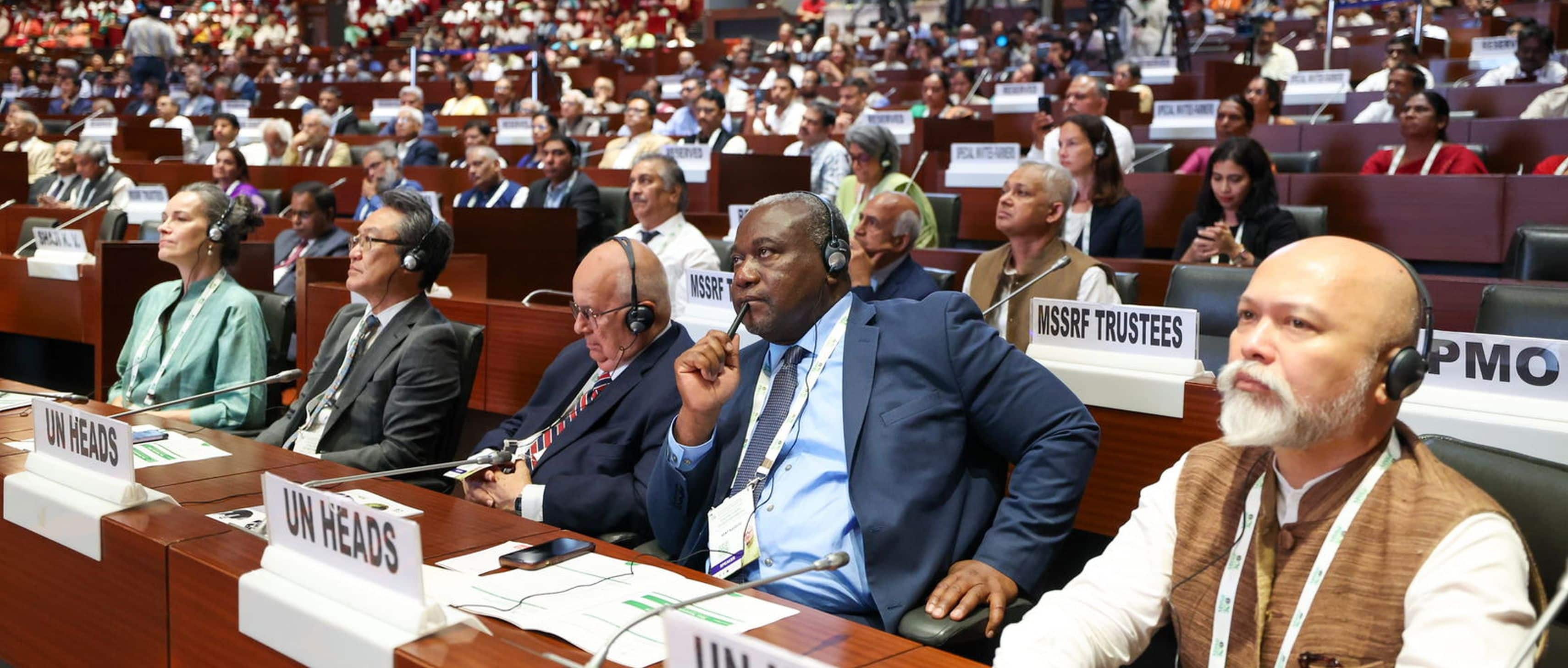My colleagues of the Council of Ministers, Shri Thawar Chand Gehlot ji,
Shri Vijay Sampla ji,
Shri Ramdas Athavale ji,
Shri Krishan Pal ji,
Shri Vijay Goyal ji,
Secretary Social Justice and Empowerment, Lata Krishna Rao ji;
And all the dignitaries present here;
Brothers and sisters,
I am really fortunate to dedicate the Dr. Ambedkar International Centre (DAIC) to the country. Moreover, my joy has doubled due the fact that I had laid the foundation-stone for this international centre in April 2015. This grand International Centre is ready not only in a very short time but before its scheduled time. I congratulate every department associated with the construction of this centre.
I sincerely hope that this Centre will prove to be a great inspiration for spreading Babasaheb's teachings.
Dr Ambedkar International Centre for socio-economic Transformation is a part of the Dr. Ambedkar International Centre. The centre will also play a significant role for research in social and economic issues.
This centre will also be a platform for the discussion on how to focus on economic and social issues by incorporating the mantra of 'Sabka Sath Sabka Vikas' also known as 'inclusive growth'. This centre will be a think tank for it.
Friends,
I believe that this Centre will prove to be a boon for the new generation who can come here and understand Babasaheb's vision.
Friends, several great souls were born in our country from time to time, who not only became the face of social reform but also played a significant role in building the future of the country and shaping the thought process of the country. The strength of Babasaheb is evident from the fact that over the years attempts have been made to suppress his ideas and to negate his contribution in the nation building process but no one could erase the ideas of Babasaheb from the minds of the Indians.
I won't be wrong to say that the people today are more influenced by the ideas of Babasaheb than the family which was behind the conspiracy. We are indebted to Babasaheb for his contribution to the nation building. Our government is making efforts to spread the ideas of Babasaheb to more and more people, especially to the younger generation so that they can study them.
Therefore this government is trying to develop those places that are associated with the life of Babasaheb as pilgrimage centres. Dr Ambedkar National Memorial is being built in the house where Babasaheb had died in Delhi's Alipur. Similarly, the birthplace of Babasaheb which is Mhou of Madhya Pradesh is being developed as a pilgrimage centre. The London residence of Babasaheb is being transformed into a memorial by the BJP government of Maharashtra after its purchase. Similarly, Ambedkar Memorial is being built on the land of Indu mill in Mumbai. Deekshabhoomi is also being developed in Nagpur. The 'Panchteerth' or the five pilgrimage centres are in a way tribute to Baba Saheb on behalf of today's generation.
By the way, a sixth pilgrimage Centre has also been developed in the virtual world last year. This pilgrimage Centre is empowering the country and providing impetus to it digitally. Bharat Interface for Money i.e. the BHIM app that was launched last year was a tribute to Babasaheb's financial vision by this government. BHIM app has proved to be a boon for the poor, the Dalit, the backward and the exploited people.
Brothers and sisters,
We are well aware of the struggles that Babasaheb had to face in his life. But besides the struggles, his life is also full of inspirations. Far from the despair he had dreamt of an India that will be free from all the evils and will be inclusive of all. A few days after the first meeting of the Constituent Assembly, on December 17, 1946 he had said-
“I have got not the slightest doubt in my mind as to the future evolution and the ultimate shape of the social, political and economic structure of this great country. I know today we are divided politically, socially, and economically. But I am quite convinced that given time and circumstance nothing in the world will be able to prevent this country from becoming united. With all our castes and creeds I have not the slightest hesitation that we shall in some form be a united people. The type of conduct suggests that we have that capability of moving towards the path of unity by moving together with all the components.”
All these words belong to Babasaheb Ambedkar. How confident! There is no strain of disappointment! The person who had been the victim of social evils of the country was full of expectations.
Brothers and sisters,
We must admit that even after so many years of independence since the formation of the Constitution, we have not been able to fulfil those dreams of Babasaheb. Some people give more importance to the caste in which they have taken birth than the land on which they have taken birth. I believe that today's new generation is capable of eliminating these social evils. Mainly the changes that have taken place in the past 15 to 20 years are only due to the efforts of the new generation. They understand that the country is being divided on the basis of caste and the country cannot progress at the desired pace with these divisions. So I have an unwavering trust in the youth whenever I talk about freeing the 'New India' from the bondage of caste system. Today's youth holds the power to fulfil Babasaheb's dreams.
Friends,
When the country became a Republic in the year 1950 then Babasaheb had said-
"We should not be satisfied only with the political democracy. We also have to make our political democracy a social democracy. Political democracy cannot survive without a base of social democracy."
The social democracy was the Mantra of freedom and equality for every Indian. This equality is not only in terms of the rights, but also of the way of living. But even after so many years of independence there is no equality in the lives of millions of people. Even the basic amenities such as electricity connection, water connection, a small house, Life Insurance are far from accessible.
If you closely look at our government’s way of working and our work culture for the past 3 to 3 and a half years, you will notice that we have been trying to fulfil that dream of Babasaheb's social democracy. The schemes and the policies of this government focus upon strengthening the social democracy. If we look at the Jan Dhan Yojana we will see that it has provided the right of connecting with the banking system to millions of poor people of the country. They have been elevated to that class of people that have bank accounts and debit cards.
The government has helped to open bank accounts of more than 30 crore poor people under the scheme. RuPay debit cards have been provided to more than 23 crore people. Now even the poor have achieved some kind of equality as they can also queue up at the ATMs to withdraw money with their RuPay debit cards. Earlier he used to be scared of this queue and could never imagine of queuing up outside the ATMs.
How many of you get the opportunity to visit your village after every 4 or 5 months? I request those who have not been to their villages for a long time to now visit their village and see. Go and ask someone from your village about the Ujjwala scheme. You will see how the Ujjwala scheme has eliminated the difference between the households which was created by gas connections in some houses and firewood in the rest of the households. This is a major example of how the government has eliminated the social discrimination. Now even the poor households cook their food on gas ovens. Now the poor woman does not have to spend her life in the smoke of the firewood.
This is one difference which can be easily understood by the people who are more connected to their villages. When you go to your village you will also feel the influence of another scheme. The Swachh Bharat Mission has created equality among the women in the villages. The presence of toilets in some houses and the absence of the same in the others used to create a division. This used to create a threat to the health as well as safety of the women in the villages. The level of sanitation has increased to more than 70% in the villages whereas it used to be 40% before.
The government has also come up with insurance plans to strengthen social democracy. So far 18 crore poor people of the country have joined the Pradhan Mantri Suraksha Bima Yojana and Jeevan Jyoti Bima Yojana. Through these schemes, a premium of only 1 Rupee per month is required for accident insurance and 90 Paisa per day for Life Insurance.
You will be surprised to know that under the schemes, a sum of rupees 1800 crores approximately has been given to the poor. Just imagine today the poor in the rural areas are living a tension-free life.
Brothers and sisters, the essence of Babasaheb's ideology has been rooted in many forms:
Equality of respect,
Equality of law,
Equality of rights,
Equality of human dignity, and
Equality of opportunity.
Such issues have been raised by Babasaheb in his lifetime. He always hoped that the governments in India would follow the Constitution without discriminating against different castes. Today, in every scheme of this government you will see a glimpse of the efforts to give equal rights to all without discrimination.
Just recently the government has launched another scheme - 'Pradhan Mantri Sahaj Har Ghar Bijli Yojana or Saubhagya scheme'. Under the scheme, 4 crore such households will be provided free electricity connection that have been compelled to lead a life similar to the 18th century era, even after 70 years of independence. The Saubhagya scheme is going to end this inequality that was prevailing since the past 70 years.
Pradhan Mantri Awas Yojana is another such scheme that aims at removing the inequality. Even today there are millions of people in the country who do not have their own house. It is important to have a house first, be it a small or a big one.
Therefore the government aims at providing every poor of the village and the city with his own house by the year 2022. For this, the government is providing financial assistance. The lower income class and the middle income class are getting interest subsidy on loans. Efforts are being made to provide equality in terms of residence so that no one is deprived of a house.
Brothers and sisters, these programmes are moving at their determined speed and will be completed before their scheduled time.
Today this Dr Ambedkar International Centre is a living example of the fact that this government's schemes do not get stuck midway. This government has utilised its full strength in order to fulfil the set goals. This is our work culture.
We not only just synchronise our goals with the plans but also finish them on time. This is not just from now but the direction was fixed within the first few months of our governance.
You might remember, I had said from the ramparts of the Red Fort in 2014 that within one year all the government schools in the country will have a separate toilet for the daughters. We have built more than 4 Lakh toilets in schools within a year. The girls used to dropout of schools due to lack of toilets in the schools. You can very well understand the great change that has come into their lives.
Friends,
In the year 2015 I had made another announcement from the ramparts of the Red Fort itself for providing electricity to 18000 villages of the country where electricity has not reached even after so many years of independence, in just 1000 days. There are still several months left for the 1000 days to be completed and till now only 2000 villages are yet to be electrified.
Talking about the other schemes, the scheme for providing 'soil health cards' to the farmers was launched in February 2015. Our target was to provide soil health cards to the country's 14 crore farmers by the year 2018. So far more than 10 crore farmers have been given soil health cards, which means, we are not far away from the goal.
Similarly, Pradhan Mantri Krishi Sinchai Yojana was launched in July 2015. Our target was to complete 99 irrigation projects of the country that were stuck midway for years by 2019. So far 21 projects have been completed. Next year more than 50 projects will be completed. The progress of the scheme is also within the purview of the target.
We have launched the e- National Agriculture Market scheme (e-NAM) in April 2016 so that the farmers are able to get fair prices for their crops that will help them to sell their crops easily. Under the scheme, the government has planned to connect more than 580 Mandis in the country online. So far more than 470 agricultural markets have been added online.
Pradhan Mantri Ujjwala Yojana, which I mentioned earlier, was launched on 1st May last year. The government has set a target of providing gas connections to 5 crore poor women by 2019. In just 19 months, the government has given free gas connections to more than 3 crore 12 lakh women.
Brothers and sisters, this is our way of working. The government is working on the same vision of Babasaheb of providing equal rights to the poor. The government considers delays in the schemes as a criminal negligence.
Now if we consider this Centre, the decision of making it was taken in the year 1992. But nothing happened for 23 years. After coming to power this government had laid the foundation-stone of this centre and the same government has inaugurated it. The political parties who ask for votes in the name of Babasaheb will probably not even be aware of this.
Well, nowadays they are thinking of Baba Bhole instead of Baba Saheb. That's enough.
Friends,
While this centre has been completed before time, the deadlines for several other schemes are being reduced. Since all the schemes have come on track and the plans have gained momentum we are thinking of reducing the deadline so that the work gets completed as early as possible.
Recently we have reduced the deadline for 'Indradhanush Mission' by 2 years. Under the Indradhanush Mission the government is holding vaccination campaigns in those areas which were not covered under the on-going vaccination campaigns. Lakhs of children and pregnant women were left out of vaccination. But under this campaign, more than 2.5 crore children and more than 70 lakh pregnant women have been vaccinated.
Earlier, the goal of the government was to achieve full immunization by the year 2020 but now it has been reduced to the year 2018. The 'Intensified Mission Indradhanush' has been launched along with 'Mission Indradhanush' in order to achieve this goal.
Similarly, the government had set a target of 2022 to connect every village with the road but as soon as the project has gained momentum and the work is progressing at a rapid pace, we have planned to complete it by 2019 instead of 2022.
Friends,
Pradhan Mantri Gramin Sadak Yojana was started by Atal ji. But even after so many years not all villages of the country are connected with roads. This was the condition till September 2014. Let me talk about the situation when we came to power. In the month of May 2014 when I had reviewed the situation, only 57% of the villages were connected with roads. Within 3 years of persistent efforts more than 80% of the villages are now connected to roads. Now the government is working at a very fast pace to connect hundred per cent villages to road network.
The government’s emphasize is on encouraging Dalit and backward brothers and sisters living in far-flung areas of the country for self-employment. So, when we started the Stand-up India programme, we decided that every Bank branch should provide loans to at least one Scheduled Caste or Scheduled Tribe through this scheme.
Brothers and sisters,
You will be surprised to know that about 60% of the beneficiaries of the Mudra Yojana, that changed the meaning of employment, belong to Dalit, backward and tribal classes. Under the scheme loans of nearly 9.75 crore rupees have been sanctioned so far and loans of over 4 lakh crore rupees without a bank guarantee has been provided to the people.
Friends,
Social rights are not just a matter of lip service but commitment by the government. The new India that I am talking about is also the dream of Babasaheb - the India with equal opportunity and equal rights for all, the India free from the bondage of caste system, the India progressing with the power of Technology and the India following the concept of inclusive development- Sabka Sath Sabka Vikas.
Come; let us take a pledge to fulfil Babasaheb's dreams. May Baba Saheb give us the strength to fulfil these resolutions by the year 2022. I would like to end my speech with this desire.
Thank you all so very much!!
Jai Bhim!
Jai Bhim!
Jai Bhim!









